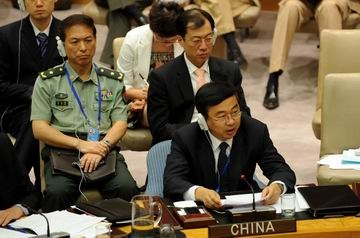| Statement by Ambassador Wang Min at Security Council Debate on Peacekeeping |
| 2010-08-06 23:10 |
|
Mr. President, I commend the Russian delegation for initiating today's meeting and thank Under-Secretary-General Le Roy for his briefing. I have listened attentively to the enlightening statements by commanders of MINUSTAH, MONUSCO, UNMIS, UNMIL and UNTSO. In particular, I wish to warmly welcome these commanders of UN peacekeeping operations to the Security Council meeting today. They have worked in harsh conditions across the world to fulfill their sacred responsibilities entrusted by the United Nations, and have made special contribution to maintaining world peace and security. The Chinese delegation wishes to pay tribute to them and other "blue helmets" around the world.
(Photograph by Shen Hong/Xinhua News Agency) Mr. President, I wish to focus on the following three points: First, the UN peacekeeping operations must be based on inclusive, strong and viable political processes. When there is "no peace to keep", peacekeeping operations are unsustainable. They can only play the role of firefighters in mandates such as civilian protection, humanitarian rescue and assistance, and development and reconstruction. At present, deployment of UN-AU hybrid operation in Darfur has almost completed, but the political process is still faced with serious difficulties. Last week, the Security Council adopted resolution 1935 to extend the mandate of UN-AU hybrid operation in Darfur. The resolution requests the hybrid operation to make it one of its top priorities to promote the political process in Darfur. This not only shows that the international community adopts a dual-track strategy in addressing the Darfur issue, but also galvanizes the two tracks into complementing and supporting each other. We hope the objectives reflected in resolution 1935 will be implemented. Second, the main objective of peacekeeping operations is to help countries in conflict stabilize their security situation and enable them to independently undertake the responsibility of running the countries and providing security and national defense at an early date. Upon deployment, peacekeeping operations need to work out and gradually improve their exit strategies. The strategies should not only focus on withdrawal of peacekeeping operations, but also focus on smooth transition to peace-building. We have accumulated rich experience in peacekeeping operations in Sierra Leone, Liberia and the DRC. We hope special representatives of the Secretary-General and commanders of peacekeeping operations will share with us more of their views and suggestions on challenges we are facing in implementing the strategic benchmark of peacekeeping operations. Third, UN peacekeeping operations are scaling up and getting more comprehensive and multifunctional. As a result, logistics lags behind and a host of challenges such as poor deployment and inefficiency of peacekeeping operations have emerged. We welcome the UN Secretariat's efforts to study and explore the issue. We maintain that the mandate of UN peacekeeping operations should set their priorities in accordance with different situations on the ground, and be more targeted and flexible. In deliberating deployment and adjustment of peacekeeping mandates, the Security Council should fully heed the views of special representatives of the Secretary-General, military commanders as well as military and civilian experts. Thank you, Mr. President. |
| |||||||||||||
| |||||||||||||
